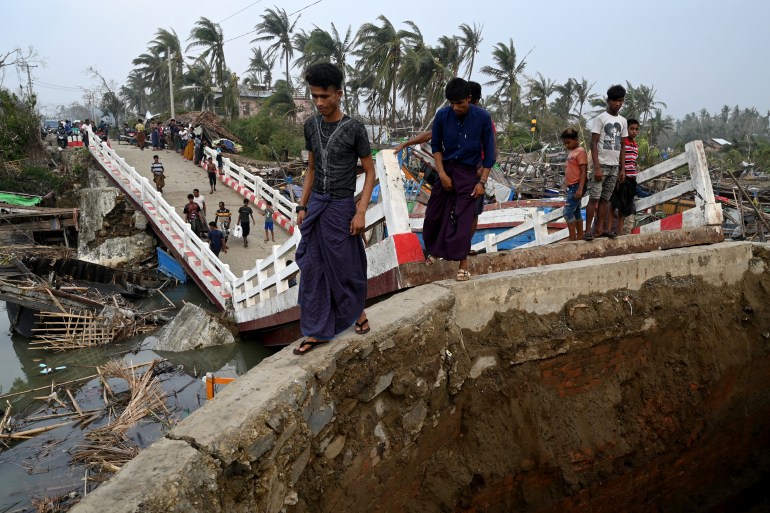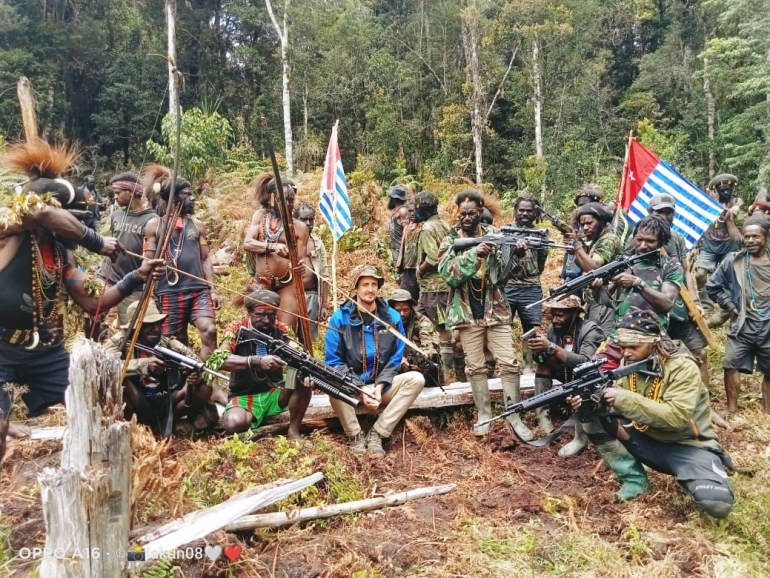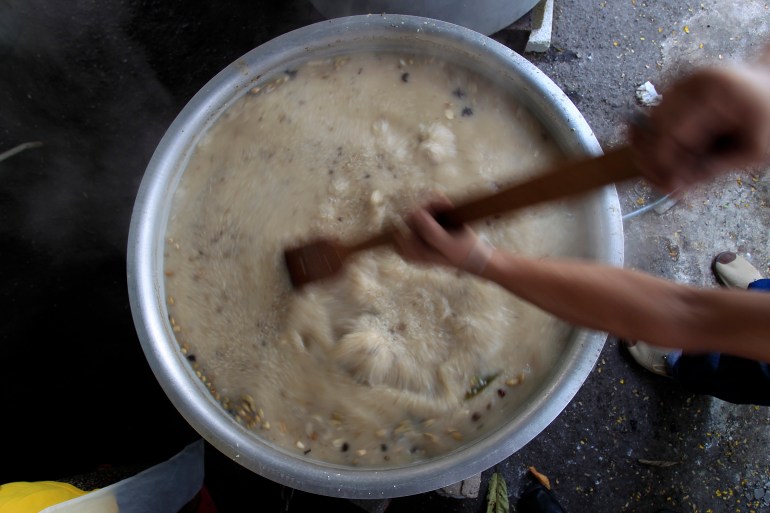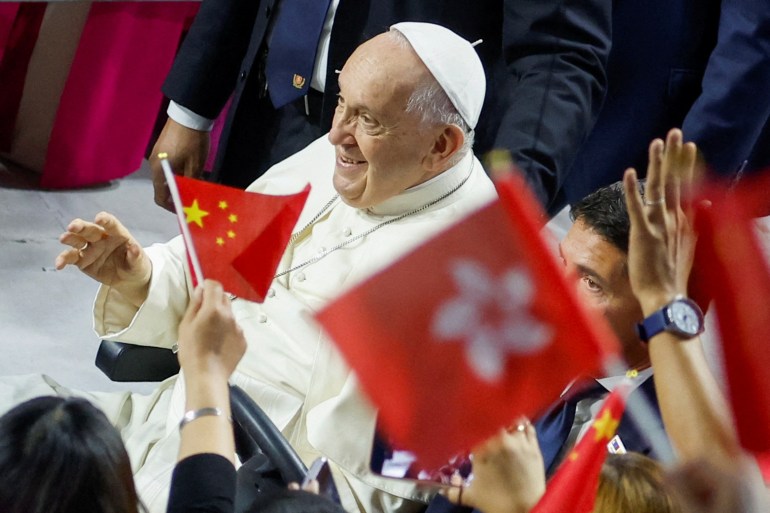[ad_1]
From the deepening conflict in Myanmar as a result of the 2021 coup to North Korea’s record years of weapons testing and confrontations in the South China Sea, it has been a busy year in the Asia Pacific.
Here are some of our most-read and must-reads from our original reporting in 2023.
Myanmar
More than two years since the generals seized power in a coup in February 2021, civilians found themselves caught in an escalating conflict, and targeted by a military notorious for its brutality.
Starting with satellite imagery of five villages burned to ashes in the country’s Sagaing region, Zaheena Rasheed and Nu Nu Lusan gathered evidence from villagers and witnesses to piece together what had happened.
“We have been working so hard for generations to build these houses and own this land, but they burned our homes and our grain in just one day,” one farmer told them. “They want us to become so poor that we do not resist them. I think they believe that if we are left with nothing, we would not resist. But they are wrong.”
You can read more in their story, Charred bodies, burned homes: A ‘campaign of terror’ in Myanmar. There is a video of the story as well.
At the end of October, three ethnic armed groups formed an alliance to begin a major offensive against the military in northern Shan state along the border with China.
Emily Fishbein, Jaw Tu Hkawng and Zau Myet Awng found Operation 1027, as the offensive was dubbed, sparking renewed optimism among anti-coup forces as the armed groups notched up early gains.
They have since made further advances from Shan state across to western Rakhine state despite a ferocious response from the military.
The fighting has worsened the humanitarian situation for many civilians, with local relief agencies providing assistance in the absence of an international response.
In Rakhine’s Minbya, a Rohingya woman told Al Jazeera she was living in fear amid relentless shelling and artillery fire.
“We can’t get out of Minbya right now. The fighting is all around,” she said in November. “I can hear bombing and gunfire every day, but I don’t know where they’re fighting. There’s no internet and the phone also often doesn’t work. I worry about everything.”
Rakhine has long been a troubled state. Home to the mostly Muslim Rohingya, it was where the military launched a brutal crackdown that sent hundreds of thousands of people fleeing into neighbouring Bangladesh in 2017.

Many of those who remain are forced to live in camps where their movements are restricted.
These areas were hit in May by Cyclone Mocha, the most serious storm to hit Myanmar since Cyclone Nargis killed thousands of people in 2008.
Hpan Ja Brang, working with Emily Fishbein, were the first to report in international media of the devastation wreaked by the storm, especially in the Rohingya camps. You can read their report here.
Surge in trafficking
The Myanmar crisis has also had an increasing effect regionally – not just as a result of the generals’ refusal to carry through on promises to end the violence made to fellow members of the Association of Southeast Asian Nations (ASEAN), but because the instability is driving criminality.
Kevin Doyle travelled up to northern Thailand and the so-called Golden Triangle where seizures of drugs including methamphetamine and heroin have soared since the coup.
You can read more on what he found here.
Chris Humphrey, meanwhile, who is based in Hanoi, found a surge in the number of Vietnamese being trafficked into Myanmar and forced to work as sex slaves or in scam call centres.
And Alastair McCready went to Laos where he discovered the supply of methamphetamine had grown so much that it had become cheaper than beer.

Vietnam
Hanoi-based Chris Humphrey heard foreigners were being held in Vietnamese detention long after they had completed their prison sentences. The reason? Unpaid court fines and compensation to the victims of their crimes.
At the time the story was published, nationals from countries including Malaysia, Cambodia, South Africa and Nigeria were being held beyond their sentences in sometimes horrific conditions.
“It’s terrible. It is prison after prison,” Nigerian Ezeigwe Evaristus Chukwuebuka told Al Jazeera. “I was seriously humiliated, locked up in a dark, stinky, small room without a toilet, and my legs locked up in bars for two weeks.”
Indonesia
For 30 years until May 1998, Indonesia was ruled by strongman Soeharto.
His departure, amid mass protests, brought new freedoms for Indonesia’s more than 200 million people, particularly its ethnic Chinese minority who had long endured government-sponsored discrimination and were often targeted for their perceived wealth.
Randy Mulyanto and Charlenne Kayla Roeslie spoke to five Indonesians of Chinese descent to find out more about those times and how things had changed.
Iskandar Salim told them that he used to struggle with his identity – feeling like he was not Indonesian enough but not fully Chinese either. Now, he is proud to define himself.
“I can simply say, ‘I am Indonesian, more specifically Chinese Indonesian’,” Iskander told Al Jazeera. “In the end, our identity is ours to decide and define.” Find out more here.
Staying in Indonesia, after Aisyah Llewellyn heard that school children had been caught up in tear gas fired by police at protesters on the island of Rempang – not too far from Singapore – she went there to find out what was going on.
She discovered a controversial plan for a Chinese factory to make glass for solar panels and develop a massive eco-city. The problem? Thousands of residents would have to move to make way for it.
“This is my home and this is where I want to die,” 80-year-old Halimah told Al Jazeera. “I love this place more than anything.”
You can learn more about the villagers and their determination to stop the project here.
A year after the tragedy at the Kanjuruhan football stadium in Malang, Llewellyn flew to the city to speak to the families of some of the 135 people who died.
The stadium has been demolished and will be redeveloped but the struggle to reform Indonesian football will not be so simple. You can read that piece here.

And finally, the kidnapping of New Zealand pilot Phillip Mehrtens by an armed group fighting for independence in Papua drew renewed international attention to the long-running conflict in the resource-rich region.
Here’s the story from Kate Mayberry. Mehrtens is still being held captive.
Military developments
Military developments were a key focus of the year, with North Korea testing a record number of weapons as it stepped up efforts to modernise its armed forces.
In September, leader Kim Jong Un made a rare trip out of his country, boarding his armoured train on a mission to visit Russian President Vladimir Putin at the Vostochny Cosmodrome.
Putin agreed to help Kim build satellites and officials showed off Russia’s military technology, In November, North Korea put its first spy satellite into the air – after three failed launches – and is promising more for 2024.
Experts say it continues to fund such activities by illicit means – from hacking to money laundering (you can read more on the ghostly North Korean restaurants that continue to trade in Laos here). The big question is what North Korea is giving Russia in return for its help. Weapons, probably.
Kim argues he needs to develop his country’s arsenal because the United States is deepening its military and political relationship with South Korea. The US, meanwhile, says it has to work more closely with Seoul and its allies because of the increasing threat from Pyongyang.
It is a similar story in the South China Sea, where Beijing has come into multiple confrontations with Manila in the Second Thomas Shoal and Scarborough Shoal.
To much concern in Beijing, the situation has pushed the Philippines closer to the US. Zaheena Rasheed travelled to the country to find out why. You can read that story here.
China
2023 was the year China emerged from years of isolation as a result of its zero-COVID strategy.
That policy meant relentless testing, isolation or quarantine camp. Erin Hale discovered months after the policy was lifted that many of the vast camps remained.
Meanwhile, in this story, Frederik Kelter reported many Chinese had struggled to recover from the trauma of zero-COVID and the abrupt decision to drop it following unprecedented protests.
“So many people suffered under the zero-COVID policy and so many people died when it ended,” Evelyn Ma told Al Jazeera.

We also took a closer look at China’s growing influence in the Solomon Islands and the curious case of a shipment of what were said to be “replica” weapons from China.
John Power and Erin Hale got hold of a US cable that suggested the weapons were actually real.
The story prompted Solomon Island MPs to demand answers as well as a denial from the country’s police.
You can read those stories, here and here.
Religion
The Asia Pacific is home to a wide variety of religions, from Buddhism to Christianity and Islam.
Raphael Rashid looked at how plans for a tiny mosque in the South Korean city of Daegu triggered a wave of virulent Islamophobia, which saw pig heads left rotting outside the building and protesters holding pork barbecues. You can read more on that story here.
We also reported on how Beijing is asserting control over religions, from Catholicism to Islam.
As Theresa Liu, a Chinese Catholic who follows the church in Rome, told Al Jazeera: “The government is trying to control everything about our religion – how our churches look, who our priests are, the way we pray. I think different religious groups all over China are having trouble with the government.”
That story – from Frederik Kelter – is here.

On a lighter – or should it be heavier – note, Marco Ferrarese profiled the Taiwanese death metal band Dharma. Their unique selling point – their lyrics are actually Buddhist verses and nuns join them on stage.
That story is here.
In Malaysia, meanwhile, Ramadan is known for unique dishes that can only be found during the Muslim fasting month. One of them is bubur lambuk from the Masjid Jamek Kampung Baru Mosque.
Ushar Daniele and Bhavya Vemulapalli joined the mosque’s volunteer chefs to find out the secret to the creamy porridge’s popularity.
[ad_2]
Source link
